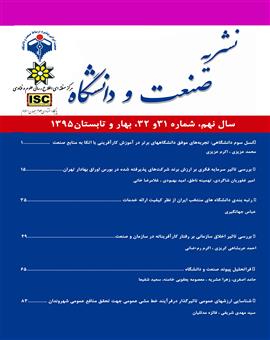نسل سوم دانشگاهی: تجربههای موفق دانشگاههای برتر در آموزش کارآفرینی با اتکا به منابع صنعت
محورهای موضوعی : عمومى
1 - دانشگاه تهران
2 - دانشگاه تهران
کلید واژه: کلمات کلیدی: برنامه های کارآفرینی, آموزش, صنعت, دانشگاه نسل سوم, دانشگاههای برتر,
چکیده مقاله :
آموزش یک عنصر پیشن نیاز در تعیین و تقویت شرایط و چارچوب کارآفرینی برای توسعه اقتصادی است. دانشگاههای برتر دنیا به این نتیجه رسیده اند که از طریق برنامه ها و آموزشهای دانشگاهی میتوان کارآفرینی را در بین دانشگاهیان افزایش داد. این تحقیق با هدف شناسایی تجربیات دانشگاههای برتر در آموزش کارآفرینی انجام شده است. جامعه آماری این پژوهش دانشگاههای برتر در زمینه آموزش کارآفرینی است. جامعه مورد مطالعه این تحقیق دانشگاههای برتر در زمینه کارآفرینی با توجه به رتبهبندی سالانه مراکز معتبری چون مجله کارآفرین و تایمز انتخاب شدهاند. جهت جمعآوری اطلاعات از روشها و ابزارهای مختلفی چون بررسی اسناد و مطالب انتشاریافته در سایت های اینترنتی این دانشگاههای برتر و گزارشهای آنها بوده است. یافتههای این پژوهش نشان میدهد که در دانشگاههای برتر برای آموزش کارآفرینی از لحاظ ویژگیهای نهادی دانشگاه، حوزه و قلمرو آموزش، شیوه اجرای دوره ها، فعالیتهای ترویجی و گسترش و ارزشیابی با اتکا به منابع صنعت توجه ویژه ای کرده اند. یافته های این مقاله می تواند برای دست اندرکاران صنعت، آموزش عالی و دانشگاهها در خصوص سیاستگذاری و اجرای برنامه های آموزش کارافرینی کمک شایانی نماید.
Education is prerequisite for development and fostering entrepreneurship framework in development of economy. World top entrepreneurial universities have been accepted that formal university education program can improve entrepreneurship among graduates and academies. Goal of This research is to find how to institutialization of entrepreneurship education in universities. Statistical population of this research comprised of Top universities in entrepreneurship education. Statistical samples of top universities in entrepreneurship are selected in terms of acredited centers like Entrepreneur and Time magazine on 2016 academic year. For gathering information different methods and instruments like documentations that have been published on university websites. Findings of this research showed that: top entrepreneurial universities on entrepreneurship education are paying more attention to scope, method of carrying out, evaluation, institutional factors and outreach activities. Findings of this research can help more to stakeholders of higher education institues and universities authorities on policymaking and executing of entrepreneurship education programs.
Baptista, R. J. Leitão (eds.), Entrepreneurship, Human Capital, and Regional Development, International Studies in Entrepreneurship 31, DOI 10.1007/978-3-319-12871-9_1
عزیزی، محمد؛ محمود احمدپور داریانی؛ زهرا صباغیان؛ بررسی ویژگیهای کارآفرینی دانشجویان؛ چشم انداز مدیریت بازرگانی؛(4) 13-14؛ 163-190. (1383)
Kyrö, Paula. 2005. “Entrepreneurial learning in a Cross-Cultural Context Challenges Previous learning Paradigms.” The Dynamics of Learning Entrepreneurship in a Cross-Cultural University Context. Entrepreneurship Education Series 2: 68-102.
EC (European Commission). 2012. Effects and Impact of Entrepreneurship Programmes in Higher Education. Brussels: Directorate-general for Enterprise and Industry.
عزیزی, محمد و مرتضی طاهری؛"تأثیر آموزش کارآفرینی بر قصد و ویژگی های کارآفرینانۀ دانشجویان." فصلنامه نوآوری و ارزش آفرینی(4).. (1392)
Rae, David. 2010. “universities and Enterprise Education: Responding to the Challenges of the new Era.” Journal of Small Business and Enterprise Development 17 (4): 591–606.
Rehn, A., M. Brannback, A. Carsrud, and M. lindahl. 2013. “Challenging the Myths of Entrepreneurship?”Entrepreneurship & Regional Development 25 (7–8): 543–551. doi:10.1080/08985626.2013.818846.
Katz, J. 2003. The chronology and intellectual trajectory of American entrepreneurship education 1876–1999. Journal of Business Venturing, 18: 283–300.
Brush, C., I. Duhaime, W. Gartner, A.Stewart, J. Katz, M. Hitt, S. Alvarez, G. Meyer, and S. Venkataraman (2003). “Doctoral Education in the Field of Entrepreneurship,” Journal of Management,309-331,(3)29.
Kuratko, Donald F. 2005. “The Emergence of Entrepreneurship Education: Development, Trends, and Challenges.” Entrepreneurship Theory and Practice 29 (5): 577–598. doi:10.1111/j.15406520.2005.00099.x.
Van Vuuren, JJ. and Nieman, G.H. (1999), "Entrepreneurial education and training: a model for syllabi/curriculum development", Proceedings of the 45th ICSB World Conference, Naples. http://www.sbaer.uca.edu/research/icsb/1999/93.pdf
Streeter, Deborah H.;John P. Jaquette; Jr. Kathryn Hovis(2002); University-wide Entrepreneurship Education: Alternative Models and Current Trends; Department of Applied Economics and Management
MIT (MIT Entrepreneurship Center): Background. Http://entrepreneurship.mit.edu. http://www.gsb.stanford.edu/cmc/
http://www.mccombs.utexas.edu/research/hkcenter/
http://www3.babson.edu/eship/
http://www.wep.wharton.upenn.edu/Research/overview.html
Blenker, Per, Signe Hedeboe Frederiksen, Steffen Korsgaard, Sabine Muller, Helle neergaard, and Claus Thrane. 2012. “Entrepreneurship as Everyday Practice: Towards a Personalized Pedagogy of Enterprise Education.” Industry and Higher Education 26 (6): 417–430.
Shane, S. A. (2004). Academic entrepreneurship: University spinoffs and wealth creation. Edward Elgar Publishing.
http://epe.cornell.edu/
http://entrepreneurship.berkeley.edu/
http://www.hbs.edu/entrepreneurship/
http://www.business.uvic.ca/008_BComHome/204_Entrepreneurs.html
http://www.marshall.usc.edu/web/Lloydgreif.cfm?doc_id=1055 .
http://www.anderson.ucla.edu/x1012.xml
http://www.emkf.org
Etzkowitz, Henry;(2003) The Rise of the Entrepreneurial University, Science Policy Institute State University of New York, Purchase, New York, 10577 USA
حسینی نرگس، مهدیون روح اله، یارمحمدزاده پیمان؛ عوامل مؤثر در برقراری ارتباط دانشگاه و صنعت. ۱. ۱۳۹۴; ۸ (۲۹ و ۳۰) :۷۳-۸۶.(1393)
احمدی زهرا. شناسایی عوامل موثر بر ارتباط دانشگاه و صنعت . ۱. ۱۳۹۴; ۸ (۲۹ و ۳۰) :۶۳-۷۲.(1393)

